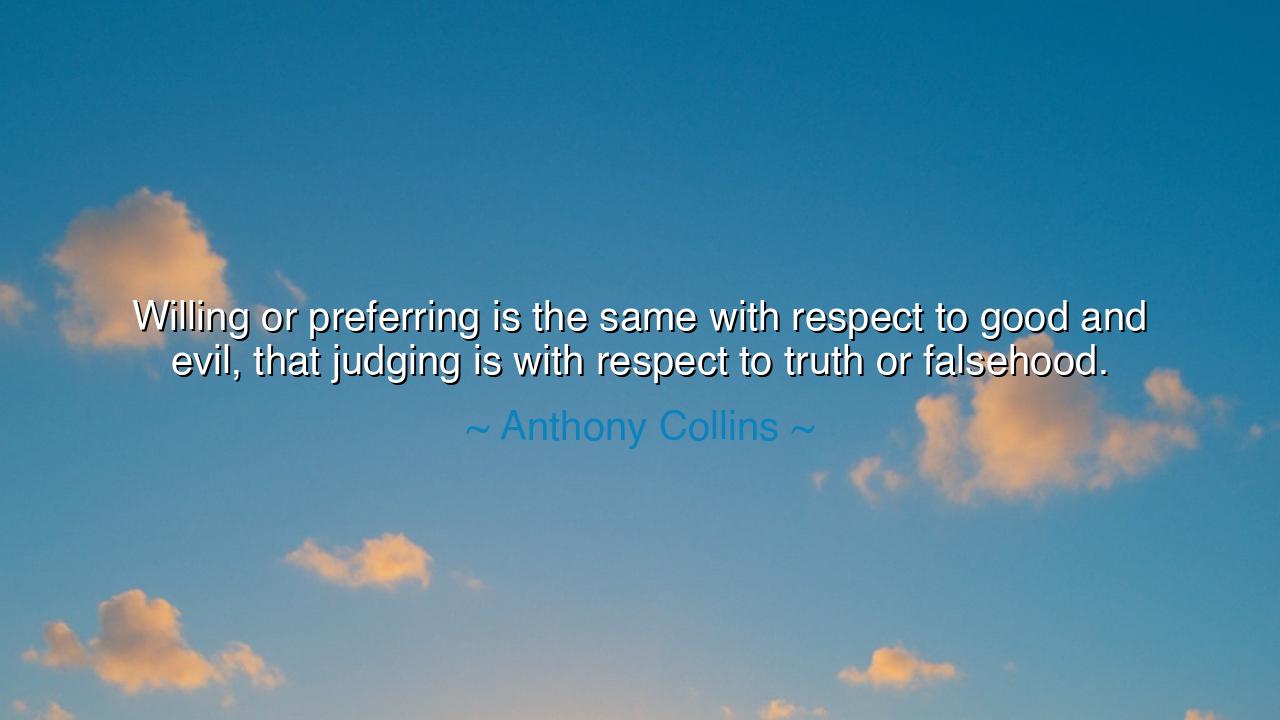
Willing or preferring is the same with respect to good and evil
Willing or preferring is the same with respect to good and evil, that judging is with respect to truth or falsehood.






"Willing or preferring is the same with respect to good and evil, that judging is with respect to truth or falsehood." These words from Anthony Collins invite us into a profound reflection on the nature of choice, judgment, and the moral compass that guides human action. Collins draws a compelling parallel between the act of choosing between good and evil and the act of discerning between truth and falsehood. In essence, he is telling us that both moral decisions and epistemological judgments (decisions about what we believe to be true or false) stem from the same fundamental faculty of the mind—our ability to will, prefer, and judge.
In the ancient world, the philosophers of Greece and Rome grappled with similar questions. Socrates, who believed that knowledge and virtue were intertwined, would often argue that truth was the foundation of moral goodness. For Socrates, to know the good was to act in accordance with it, and this was a decision born out of reason and judgment. Plato, in his work The Republic, also recognized the deep connection between reasoning and moral action. For Plato, the soul was structured in such a way that the rational part should govern the spirited and appetitive parts, ensuring that one’s actions were in line with truth and virtue. In these ancient texts, we find that judgment is seen as both an intellectual and a moral process—a means by which we discern truth from falsehood and good from evil.
Aristotle, too, in his Nicomachean Ethics, posited that the good life was the result of rational choices, where reason guides the will in making decisions that lead to human flourishing. For Aristotle, moral virtue was a habit formed by repeatedly making good choices—choices rooted in reason and judgment. In his view, choosing the good is not merely about personal preference, but about aligning one’s will with rational principles of what is truly good. In this way, willing and preferring the good is analogous to judging what is true, as both actions require a rational process that guides the individual towards a virtuous and truthful life.
In more modern history, Immanuel Kant, the German philosopher, took this connection even further with his concept of moral law. Kant argued that humans have an intrinsic ability to judge what is morally right and wrong, a faculty he called the categorical imperative. He suggested that moral decisions are not based on personal desires but on universal principles that can be reasoned out. For Kant, judging what is good or evil was akin to judging what is true or false—both are guided by the reasoning mind, which compels us to act in ways that uphold universal truths and moral duties. In this sense, Collins' statement mirrors Kant’s insight: both willing the good and judging the truth come from the same rational process that shapes our moral and intellectual lives.
A historical example that mirrors Collins' reflection can be seen in the abolitionist movement during the 19th century. Frederick Douglass, an escaped slave turned abolitionist, exemplified the profound connection between moral judgment and truth. As Douglass learned to read and write, he came to realize the truth of freedom and the evil of slavery. This was not merely a matter of preference; it was a moral judgment, one rooted in the fundamental understanding of human dignity. Douglass used his intellect to see the truth of human equality and then acted in alignment with that truth, risking his life to speak out against the falsehoods of racial superiority. His life serves as a testimony to how reason and judgment lead to the rejection of evil and the embrace of good.
The lesson from Collins' quote is clear: our choices and judgments are not mere whims or personal preferences. They are deeply tied to the rational faculties that allow us to distinguish between good and evil, between truth and falsehood. To act morally is to judge rightly, to will and prefer the good, even when it is difficult or unpopular. This is not a passive process; it requires self-reflection, reason, and a commitment to truth.
In our own lives, we must strive to cultivate this capacity for moral reasoning. We must engage in the hard work of distinguishing between right and wrong, not by the fleeting impulses of the moment, but by aligning ourselves with universal principles of truth and justice. Whether in personal relationships, our professional lives, or in our broader social and political actions, we must judge with clarity and act with integrity. By doing so, we not only align ourselves with the truth but help to create a world where goodness and justice prevail. Willing the good and judging the truth are the foundations of a virtuous life—one that is guided by reason, rooted in honor, and dedicated to the greater good.






AAdministratorAdministrator
Welcome, honored guests. Please leave a comment, we will respond soon